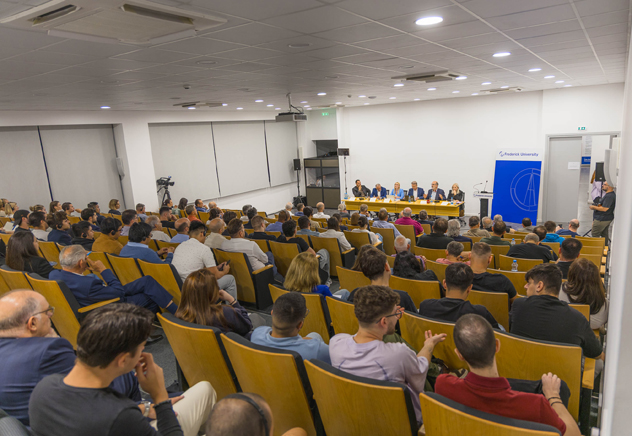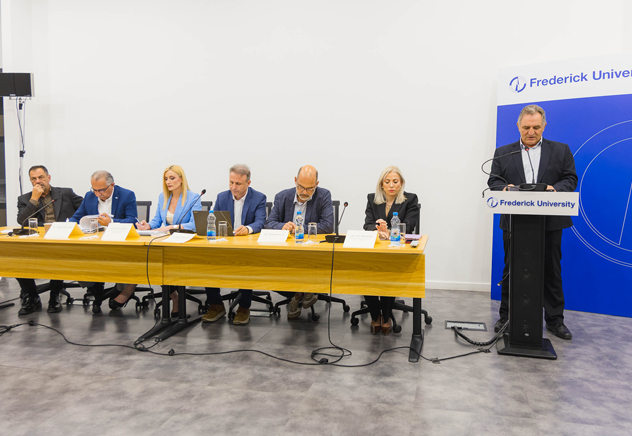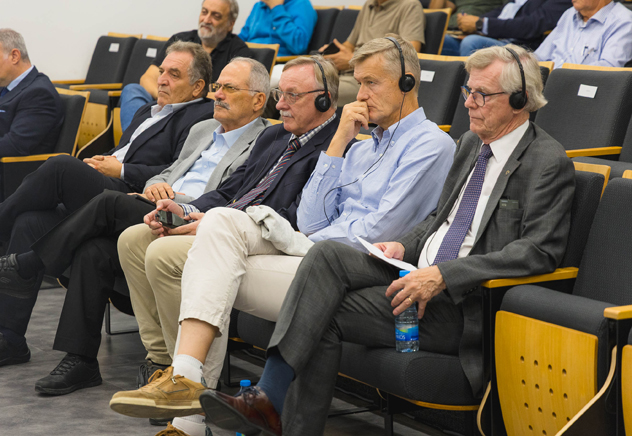
Discussion on Limassol's traffic congestion leads to call for coordinated action

Drawing strong interest and active participation from the public, Frederick University hosted a lively discussion on November 7th focused on Limassol's traffic congestion as well as free access to the beach.
The Department of Maritime Transport and Commerce and the Department of Architecture of Frederick University, within the framework of the Blue Limassol Forum and in collaboration with the Municipality of Limassol, co-organised the public discussion titled “Traffic and Coastline: Challenges and Prospects for Limassol.”
The discussion attracted significant interest from stakeholders, experts, and citizens, highlighting the need for coordinated actions that will enable Limassol to effectively address the pressures caused by rapid growth and coastal activity.
Participants included Mr. Yiannis Armeftis, Mayor of Limassol; Mr. Yiannis Tsouloftas, President of the Limassol District Organisation of Local Government (EOA); Ms. Fotini Tsiridou, Member of the House of Representatives; Ms. Evi Anagiotou, representative of the Department of Public Works; Dr. Loukas Dimitriou, Transport Engineer and member of the academic staff at the University of Cyprus; Professor Byron Ioannou, Head of the Department of Architecture at Frederick University; and Dr. Angelos Menelaou, Head of the Department of Maritime Transport and Commerce at Frederick University.
The discussion was moderated by Dr. Menelaou and Dr. Yiannis Voudouris, both faculty members of Frederick University’s Department of Maritime Transport and Commerce.
The event opened with welcoming remarks from Professor Michael Komodromos, Vice-Rector for Research, Development and International Relations at Frederick University, who praised the University’s role in generating knowledge and collaborating with the local community to improve quality of life.
Limassol — Cyprus’s "economic engine" — continues to grow rapidly; however, its infrastructure, public transport, and urban planning have not kept pace with population growth and increasing activity. As a result, the city faces severe challenges, including traffic congestion, limited accessibility, pressure on the coastal zone, and issues related to beach management and the rational use of the waterfront.
Opening the first panel on traffic congestion, Dr. Menelaou emphasised that Limassol needs targeted solutions that address the root causes of the problem — namely, the rapid rise in population and vehicles, as well as unplanned development that has left the city unprepared. He stressed that solutions must be based on quality management and accompanied by strict timelines to deliver measurable results.
In his remarks, Mayor Armeftis presented the ongoing initiatives to improve traffic flow and urban accessibility, underlining that these interventions cannot deliver substantial results without accelerating major infrastructure projects such as the Northern Bypass (expected to begin in 2026), whose timely completion is a prerequisite for the sustainable development of Limassol. The Mayor also referred to the Marine Spatial Plan, expressing concern about government delays that, as he noted, hinder project maturity and risk the loss of EU funding.
Ms. Anagiotou presented the Ministry of Transport, Communications and Works’ projects and stressed the importance of collaboration with local authorities. She highlighted the rapid population growth in the greater Limassol area, particularly in communities above the highway, which puts enormous pressure on infrastructure and calls for a revision of urban planning.
Ms. Tsiridou presented the draft law “The Decongestion and Sustainable Mobility Law of 2025,” which provides for the creation of Traffic Management Centres and a digital “smart mobility” application. She pointed out that Limassol contributes more than 50% of Cyprus’s GDP yet receives only 5% of public investment, stressing the need for fairer support and institutional adaptation to avoid delays in critical infrastructure projects.
In his intervention, Mr. Tsouloftas, President of the EOA Limassol, underlined that addressing the city’s traffic challenges requires an integrated and coordinated approach and close cooperation among all relevant bodies. He noted that fragmented efforts slow progress, whereas synergy can accelerate the implementation of realistic solutions.
Dr. Dimitriou emphasised the need for polycentricity and a cultural shift toward sustainable mobility, noting that citizens should expect a gradual transition as new mobility policies take effect.
The second panel, moderated by Dr. Yiannis Voudouris, focused on the city’s relationship with the sea and the challenges of coastal management.
The Mayor stressed the importance of strictly enforcing regulations for the protection of the shoreline and ensuring free public access to all beaches, highlighting that development must respect public space.
Mr. Tsouloftas noted that it is important to recognise, including at the European level, the high quality of Limassol’s seawater, despite isolated incidents of pollution.
Ms. Tsiridou returned to the legislative aspects of coastal management, emphasising the need for institutional modernisation and improved oversight of how coastal areas are used.
Professor Ioannou presented the concept of integrating the port with the city through an open, functional, and sustainable public space, while Dr. Menelaou addressed marine environmental policy, referring to the “cold ironing” project — the electrification of ships while docked — which is part of EU regulations and could significantly reduce pollution and the energy footprint of ports. He expressed concern that bureaucratic delays may hinder its implementation, warning that failure to adapt in time could have negative ripple effects for Cyprus and its maritime sector.
The event demonstrated that there is knowledge, willingness, and strong interest from both authorities and citizens. The key challenge now is to move from discussion to action, so that Limassol can evolve into a modern, accessible, and green city — one that breathes freely by the sea while preserving its unique identity.
Participants concluded the event with a shared commitment to meet again at the Blue Limassol Forum in May 2026 to review progress on the issues discussed, exchange experiences, and continue the dialogue with the public.



